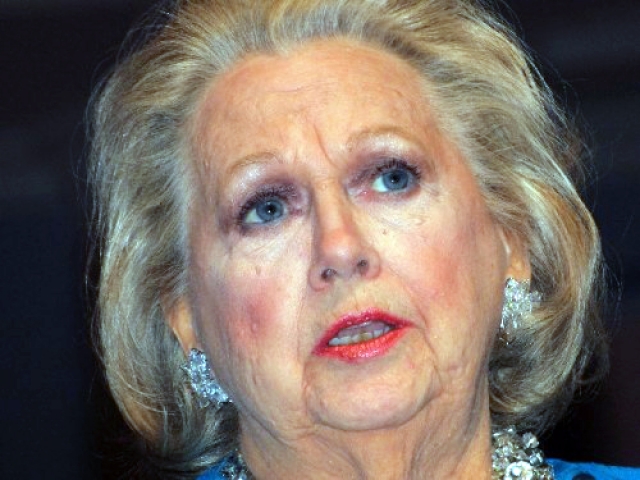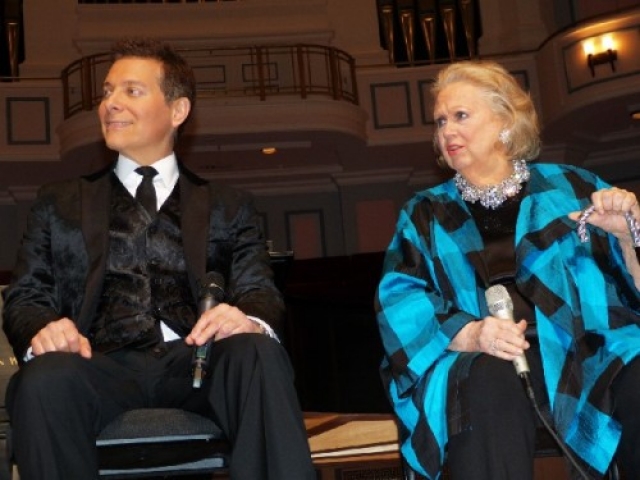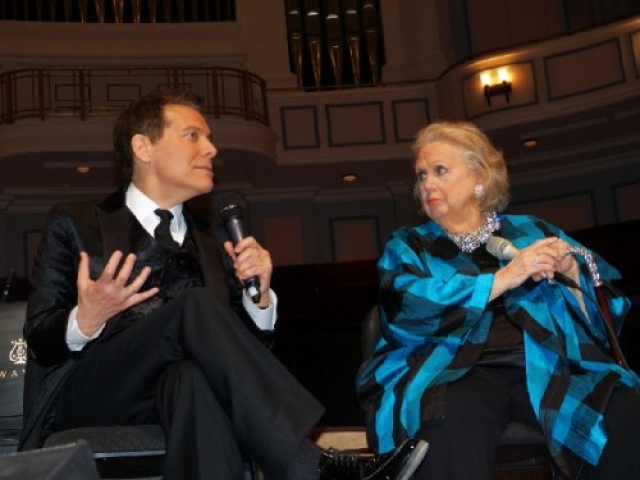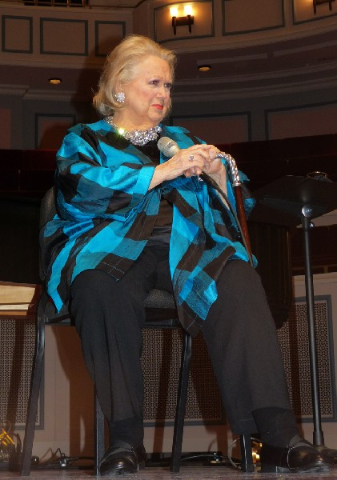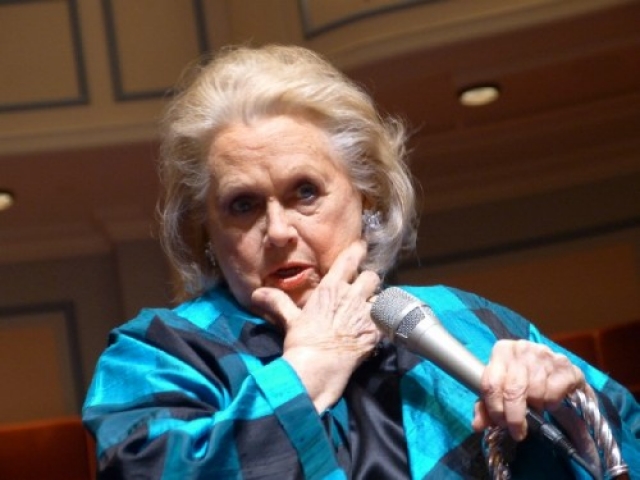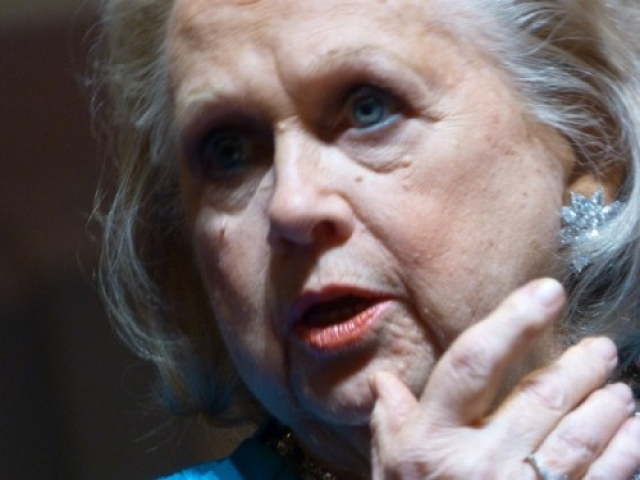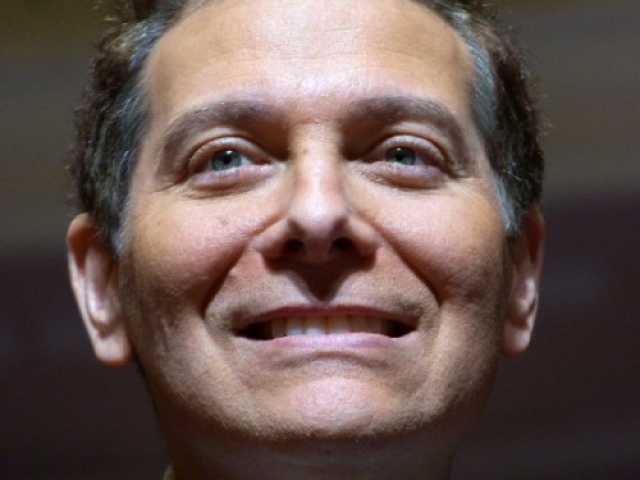Remembering Barbara Cook
Iconic Broadway and Cabaret Singer at 89
By: Charles Giuliano - Aug 08, 2017
It wasn’t that long ago when Barbara Cook then in her late 80’s retired from performing. She died this week in her Manhattan home at the age of 89.
Although familiar with her many recordings and Broadway shows she was 80 when we first heard her in concert at Ozawa Hall.
By then she was past the technical prowess that gained her stardom in the initial Broadway run of The Music Man. It lasted three years but she left after two to bear her only child, a son.
Like many of the greatest jazz and cabaret singers, if she lost a step in her range that was more than compensated by her unique gift for selling a song an making and audience feel the meaning of heart-felt lyrics. The greatest artists have that late life sense of swing and phrasing.
There had been lost years of self abuse and until the end she struggled with obesity. She achieved sobriety in 1977 and gradually not only recovered her career as a concert performer but took it to a new iconic level.
Looking back we have compiled excerpts from our reviews.
2008
Ozawa Hall, Tanglewood
During Cook's 90 minute set she introduced each new song with charmingly anecdotal material. In addition to having a magnificent, soft, sweet and seductive voice she is also a veteran actress. Cook brought all of her skills together in a heady mix that utterly intoxicated the audience.
To prepare for such an occasion Cook described how for months there are piles of arrangements strewn over the dining room table. She agonizes over the material and the daunting task of selecting her very favorite songs. Extending that image the performance evoked the feeling that we have moved from the dining area to the living room. Somehow the setting of Ozawa Hall morphed into her parlor as we got to meet her friends. Including her best friend, Stephen Sondheim, who "Most of the time is just my friend Stephen. We talk about the aches and pains of aging. But when I am working on one of his new songs he becomes Stephen Sondheim. He is one of our greatest living treasures like the late George Gershwin and Jerome Kern."
As the evening progressed it became clear why she prefers Sondheim who was well represented in her performance. Even though she selected works by the great composers of theatre and films- George and Ira Gershwin, Irving Berlin, Rodgers and Hammerstein, Rodgers and Hart- often it was more obscure songs or the ones which were not always the best known hits in "Oklahoma," "South Pacific" or a Disney film like "Song of the South."
The material lent itself to lyrics that convey compellingly personal and emotional stories. There was an emphasis on the dramatic and poignant. Now in her 80s, and still in full command, Cook presented an evening that appears to summarize her personal experiences. There was the evocation of a life richly lived and conveyed in wonderfully poetic song.
Introducing the trio which performed with her Cook said "I am so lucky to be on stage with these guys." With Lee Musiker, piano, Peter Donovan, string bass, and James Saporito, drums they were perfectly understated in catching all of ever shifting nuances of mood and tempo. The piano of Muskier led her gently through the most tenderly rendered ballads. Then they could kick up and really swing through more up-tempo numbers. She even did a bit of scat during a Ray Charles number. The set proceeded with constantly changing pace and textures. After taking us through the most poignant aspects of romance she could be fun and lively romping through classic show tunes…
Introducing a song she stated "There is so much talk about the Great American Songbook. It is interesting that so many of those songs were written by immigrants like Irving Berlin. I don't know much about immigration. But if they can write great songs I think we should let them in." It evoked a round of applause from the audience. She then sang a selection from his show "Annie Get Your Gun."
Cook talked about growing up in Georgia. When she was a kid she won a talent show at the Roxy. The prize came with an invitation to join a traveling company. She was underage and needed parental permission. There was another problem, it was a burlesque show, and a couple of the women were "topless." But she was too short for that and instead was taken on as a tap dancer…
(As a finale)…Setting aside the mike she was accompanied by piano as we were treated to the pure tone of her ballad filling Ozawa Hall. Reaching out to the audience she conveyed that "We'll Be Together Again." What a magnificent moment.
2010
Sondheim on Sondheim
Studio 54, New York
….Send in the Clowns, his (Sondheim) one and only hit tune, from 1973’s A Little Night Music. A revival of that show is a current Broadway hit…In one of the most amusing numbers of the evening there was a pastiche of versions including Sinatra’s. They toyed with it off and on and finally our dreams came true, at the end of the second act, when Barbara Cook performed it poignantly.
Having Cook in the cast was the real treat of this production. There was evident love and reverence as cast members assisted her on and off the stage. Mostly she was seated while singing… it was such a blessing to hear her perform. What a magnificent voice. Cook brings such passion and life experience to the complex and compelling lyrics.
2013
Center for the Performing Arts
Carmel, Indiana
The capacity audience was thrilled when Michael Feinstein escorted the 85-year-old national treasure (officially recognized with a Kennedy Center Award) Barbara Cook. The excitement prevailed through a ninety minute set with an encore.
Hanging her cane at the edge of the grand piano Cook settled into a seat with Feinstein on a stool beside her. From the get go the warmth and mutual admiration of the singers soared through the multi-tiered concert hall. During the evening he hugged and kissed her several times. You could feel the love.
They opened with “I’ve Got the World on a String.” The 1932 popular song was composed by Harold Arlen, with lyrics written by Ted Koehler. It was written for the 1932 Cotton Club Parade. It was introduced by Cab Calloway and Bing Crosby and was recorded by Frank Sinatra in 1953…
During the performance Cook often commented on how much she learns by working with Feinstein. On a stand next to her seat was a stack of printouts of the lyrics of the songs. She told us that much of it was not a part of her usual set list. For songs like “Makin' Whoopie” he had provided her with less than familiar lyrics of the Eddie Cantor standard. Some of them were a bit risqué.
There were times when she lost the lyrics but a glance at the cheat sheets, and some judicious prompting from Feinstein, got her back on track…While resonant and stunning, her voice is not what it used to be.
She noted that she is the last one standing, sitting actually, of the performers of her generation…She informed us that Elaine Stritch (born February 2, 1925) has announced her retirement. She also speculated on the status of Chita Rivera (born January 23, 1933).
Telling us that she has recently dropped 30 pounds, overall, she is in good health. Although life on the road is tough on a senior like the 15 hour travel day to get to Carmel, Indiana. …
The dialogue was priceless in a passion for the music and their insights. Particularly revealing was that it doesn’t take a great voice to be a great singer.
They illustrated that by discussing the great cabaret performer Mabel Mercer. Cook explained how vocal coaches emphasize accenting the vowels. She demonstrated how Mercer changed and enhanced the cadence of a song with accents falling on consonants. She gave a couple of possible interpretations of lyrics.
During the great era of vaudeville and film noir some of the greatest stars from Fred Astaire to Eddie Cantor and Jimmy Durante were not great singers. They knew, however, how to project, accent, interpret and sell a song. Feinstein jumped in with a hilarious parody of Durante.
It made me recall Boston’s now gone Merry Go Round room in the Copley Plaza Hotel. The program focused on cabaret singers and jazz pianists like Teddy Wilson and Mary Lou Williams. During interviews Carmen McRae and Blossom Dearie discussed their unique interpretations of the canon…
In Carmel we experienced Feinstein in a different ambiance and mood (than at Tanglewood)…He spent most of the evening tethered to his companion in an intimate, understated manner. Now and then we would cut loose in a solo backed by a tight and swinging five piece band. In addition to a rhythm section of piano, bass and drums it was augmented by a multi reed player (tenor sax, flute and clarinet) as well as a trumpeter.
Humorously Cook commented that "I don't need Mr. Tumpet Man but Michael does." His style calls for brass where she requires throaty reeds…
It sent chills up your spine when Cook rendered Barbra Streisand’s “Here’s to Life.”
Arguably, it’s the female equivalent of Sinatra’s iconic, rites of passage anthem “My Way.” The audience was entranced and awarded a Standing O to lyrics that included:
No complaints and no regrets
I still believe in chasing dreams and placing bets
And I have learned that all you give is all you get
So give it all you've got
I had my share, I drank my fill
And even though I'm satisfied, I'm hungry still
To see what's down another road, beyond a hill
And do it all again
…The set alternated between solos and duets. Cook’s solos included: “The Nearness of You” “Makin' Whoopie” “If I Loved Again” “Here’s to Life.” Feinstein’s solos were "Let Me Love You” “Let There Be love.” He accompanied himself on piano for “My favorite Year.” Then “Somewhere” and “A Lot of Living to Do.”
Together they performed “I’ve Got the World on a String” “The Very Thought of You” “Tea for Two” “Cheek to Cheek” and “Give Me the Simple Life.” For an encore they performed “Shine on Harvest Moon” with Feinstein inviting the audience to sing along.
Interview
Following the performance, members of The American Theater Critics Association, having a conference in Indianapolis, were invited back into the audience Feinstein and Cook answered questions.
Michael Feinstein Through social media we find people who care about the American Songbook. Kids want to be a part of our competition because it’s anti American Idol which excludes them. There are thousands of kids everywhere who care about this music. A lot of young people who sing standards can’t get on American Idol because they demand that you do all this pyrotechnical stuff at the end which has nothing to do with the heart of the interpretation. It’s about a performance style which they require. It has nothing to do with the craft of the song.
Barbara Cook They are hoping to get finalists into big recording contracts which is about money.
MF It’s all about money. It’s about the producers of the show making a lot of money.
BC I do think there are a lot of really talented people on that show.
MF Who are being corrupted.
Question With your contest do you have to tone them down a bit. To take that American Idol quality out of the performance? So they can find the lyrics and the truth of the song?
MF The main thing we do in coaching and master classes is teaching everybody about connecting with the lyric. That informs how they sing the song. They may still do their pyrotechnic style but it is connected to the lyric. Then it’s ok. It means something.
BC With young people in general (turning to the 2013 Youth Ambassador of the Great American Songbook, the 16-year-old prodigy, Nick Ziobro who joined the Q&A) except you of course.
MF He’s an anomaly.
BC They are so concerned with singing that the only thing they have to say is “Look I can sing.” Who cares? A lot of people can sing. Who are you? What’s you life been like? Let me in. That’s what I always want to know.
MF That’s so true. When we perform it’s ourselves our personalities. It’s who we are that people are interested in.
BC People are drawn to authenticity. If young people, not you (looking at Ziobro) could understand what we really want is them. We want you. You are enough. You are always enough. That’s always true. Even though that seems to be what’s most frightening to people. Show people who you are. That’s terrifying for a lot of people. If you honestly show us your authentic self we are utterly involved. It’s one of the reasons why I think the arts are so important. Because we make that connection. The individual can connect with the artist. For that moment we are not so alone. That’s what’s so healing and important and necessary about really fine art.
Charles Giuliano Barbara we had the great pleasure of seeing you on Broadway not long ago in Sondheim on Sondheim. After that you came to Tanglewood and performed in Ozawa Hall. Last summer Michael was at Tanglewood and you’re coming back this season. Can you talk about the magic of Tanglewood, your plans for this summer, and is there any chance that you can entice Barbara to come join you? Is there any possibility of seeing the two of you together again at Tanglewood?
BC I just love Ozawa Hall.
MF I just assume you’re ready to play there again. You’ve appeared a number of times at Tanglewood. I don’t think there’s any problem with Barbara coming back.
CG What can we expect this summer?
MF Good songs.
CG You had wonderful guests artists last summer. Do you have more surprises up your sleeves for this summer?
MF This summer my two guests will be Faith Prince (Tony winner and three time nominee) and Megan Hilty (Broadway actress and Ivy in the TV series Smash). Which we are very happy about.
Last summer, completely spur of the moment, I called Liza Minnelli.
She said “What are you doing tomorrow?”
I said “I’m taking the train to Boston. I’m on my way to Tanglewood.”
She said “Can I come?”
I said “Why yeah. Don’t you have plans? She said can I come and I said sure.”
She said “I love trains.”
I asked “When was the last time you were on a train?”
Liza said “The Orient Express. I loved the dining car.”
I said “Well this isn’t exactly like that.”
Liza took the train and we went to the dining car. She said she was going to have lobster. It ended up being microwaved pizza.
Literally, completely impromptu, she came on stage and sang “New York New York.” It was a great Tanglewood moment. So maybe I can get Barbara to take the train with me.
Q We had a tour of the Great American Songbook archive. We would love to hear what it means to you and how it is run. The director talked about how some day she would like to see a separate building for it. What is so important about preserving all of this memorabilia?
BC The work that Michael has done and will do is just extraordinary. He knows exactly what he’s doing.
MF Thank you Barbara. What we want to do is build a museum here (Carmel, Indiana). To have the Great American Sonbook in a physical place. We have the Rock ‘n’ Roll Hall of Fame. The Country Music Hall of Fame. But there is no museum for the Great American Songbook. So what we are building here is an amazing archive. We have received Meredith Wilson’s (Music Man) and Henry Mancini’s from his widow and the list just goes on and on. Because people care so much about the legacy and they want to know what’s going to happen to their stuff.
BC You’ve heard me tell the story about Stephen (Sondheim).
MF Porgy and Bess.
BC Stephen Sondheim is a great admirer of the Gershwins and in particular Porgy and Bess. There was a brouhaha when they did that truncated version (American Repertory Theatre) and what Stephen did (a rant in the New York Times). Some time ago he was at the Library of Congress and asked to be able to look at the original score of Porgy and Bess. Of course you put the gloves on and have to be very careful. He said that, as a composer, by the way the pen moved he knew when he (Gershwin) was having trouble and when it just flowed. It was fascinating for him. He found it very moving and he started to cry. His tears dropped onto the original score of Porgy and Bess. So, if you ever get to see the score, and there’s a blob there, it’s Stephen’s tears. That just knocks me out.
MF That he cried?
BC Stephen cries very easily.
MF The whole point of the competition is about exposure to the music. Do I see it growing? Absolutely. The response of The Initiative that young people have had is growing. It reminds me of Liza many years ago. It was a record (1971) with The Pet Shop Boys and she sang “I’m Losing My Mind” from Follies. I know it was a version that Mr. Sondheim didn’t like because it bore no resemblance to the original song. It was a hit in England. Top Ten and she was on Top of the Pops. People started coming to her concerts on the strength of the hit single knowing nothing about her. I said “Liza what are you going to do when they get there? They’re going to expect a different kind of show.”
I’ll never forget what she said. “Honey, all you have to do is get them in their seats.” And that’s what it is. They don’t have any other judgment about it other than that they like it. The only issue of exposing young people to this music is that there is a fundamental change in concentration, attention span and exposure, which requires listening to a lyric in a way that a lot of young people don’t listen in the same way. Sometimes it takes a learning curve to say, yeah you’re listening to the beat but listen to the lyric. That can be challenging. With time people grow into it. It wears well with age.
BC It’s astonishing to me how young people don’t investigate the lyric. That will help you with the notes. It’s weird that they don’t pay attention. With a phrase that’s difficult to sing, if you know what you’re talking about, you forget about the sound. For me it’s not important. Fred Astaire didn’t have a great voice but he was a great singer. Or Jimmy Durante. He could sing a tune and had a great sense of rhythm.
MF (Parody of Durante’s style)
Q I read somewhere and I may be dreaming that you (Barbara) have a limited ability to read music. How have you been able to develop a style when, as you say, you can’t read music very well.
BC I may be wrong but sometimes I think that’s helped me. I know a very famous opera singer who tells me the way she remembers an aria is that she sees the page. As she’s singing she’s seeing the page. Well, I don’t think that’s the way to go for myself. I think a lot of people do that. I don’t know. I don’t know if I’m singing a high this or that or a low this or that. I don’t mean to put down how important it is to know music. I don’t. With Candide (Bernstein) I wish I knew how to read music then. Or Stephen’s (Sondheim) songs. Most of the songs I sing from the Great American Songbook are not that complicated. I can get the melodies rather easily. Not with Stephen. He fools you all the time. He laughs at me all the time. Barbara… Through the years occasionally it would have been good but most of the time not.
MF I just want to say that for people like us it is really important to have the allies of people who really understand what art is about and is propagated in such a way that brings more people to culture. We value so much what you do (critics) because sometimes you interpret what we do in such a way that makes it accessible to people who otherwise never come to us. For that we are extraordinarily grateful to all of you. So thank you very much.

